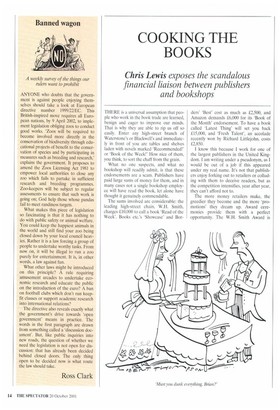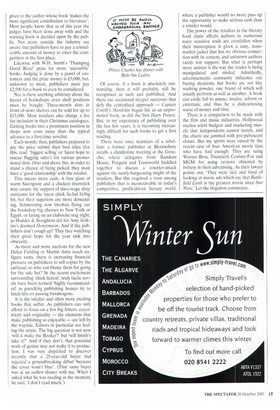COOKING THE BOOKS
Chris Lewis exposes the scandalous
financial liaison between publishers and bookshops
THERE is a universal assumption that people who work in the book trade are learned, benign and eager to improve our minds. That is why they are able to rip us off so easily. Enter any high-street branch of Waterstone's or Blacicwell's and immediately in front of you are tables and shelves laden with novels marked 'Recommended!' or 'Book of the Week!' How nice of them, you think, to sort the chaff from the grain.
What no one suspects, and what no bookshop will readily admit, is that these endorsements are a scam. Publishers have paid large sums of money for them, and in many cases not a single bookshop employee will have read the book, let alone have thought it genuinely commendable.
The sums involved are considerable: the leading high-street chain, W.H. Smith, charges £10,000 to call a book 'Read of the Week'. Books etc.'s `Showcase' and Bor ders' Best' cost as much as £2,500, and Amazon demands £6,000 for its 'Book of the Month' endorsement. To have a book called 'Latest Thing' will set you back £15,000, and 'Fresh Talent', an accolade recently won by Richard Littlejohn, costs £2,850.
I know this because I work for one of the largest publishers in the United Kingdom. I am writing under a pseudonym, as I would be out of a job if this appeared under my real name. It's not that publishers enjoy forking out to retailers or colluding with them to deceive readers, but as the competition intensifies, year after year, they can't afford not to.
The more money retailers make, the greedier they become and the more 'promotions' they dream up. Award ceremonies provide them with a perfect opportunity. The W.H. Smith Award is given to the author whose book 'makes the most significant contribution to literature'. Most people know that as of this year the judges have been done away with and the winning book is decided upon by the public. Not many outside the industry are aware that publishers have to pay a considerable amount of money to enter the competition in the first place.
Likewise with W.H. Smith's 'Thumping Good Read' prize for more 'accessible' books. Judging is done by a panel of customers and the prize money is 15,000, but, unknown to most, publishers must pay £2,500 for a book to even be considered.
Nor is there anything arbitrary about the layout of bookshops: even shelf positions must be bought. Three-month slots in front-of-store shelves can be sold for up to 113,000. Most retailers also charge a fee for inclusion in their Christmas catalogues. Getting books into a prominent position in shops now costs more than the typical advance to a first-time novelist.
Each month, then, publishers prepared to pay the price submit their best titles (for this, read 'biggest selling' or 'latest hope to rescue flagging sales') for various promotional slots. Over and above this, in order to stand a chance of being picked, they must have a 'good relationship' with the retailer.
This means more cash. A free glass of warm Sauvignon and a chicken drumstick may ensure the support of slave-wage shop assistants for the latest chick fie/lad lit/big hit, but their superiors are more demanding. Schmoozing now involves flying out the bookshop big cheeses to New York or Egypt, or laying on an elaborate stag night, as Hodder & Stoughton did for Amy Jenkins's doomed Honeymoon. And if the publishers don't cough up? They face watching their great hope for the year sink into obscurity.
As more and more auctions for the new Helen Fielding or Martin Amis reach sixfigure sums, there is increasing financial pressure on publishers to sell copies by the cartload, so who can blame them for going for the safe bet? In the recent excitement surrounding 'chick fiction', truly facile novels have been termed 'highly recommended' as panicking publishing houses try to hitch lifts on passing bandwagons.
It is the smaller and often more exciting books that suffer. As publishers can only afford to focus on a few big hitters, eccentricity and originality — the elements that make publishing so enjoyable — are left by the wayside. Editors in particular are feeling the strain. The big question is not now 'will it make the Booker?' but 'will Smith's take it?' And if they don't, that potential work of genius may not make it to production. I was very dispirited to discover recently that a 25-year-old buyer had rejected a groundbreaking debut 'because the cover wasn't blue'. (That same buyer was at an author dinner with me. When I asked what he was reading at the moment, he said, 'I don't read muck') Of course, if a book is absolutely outstanding, then it will probably still be recognised as such and published. And there are occasional sleeper successes that defy the centralised approach — Captain Corelli's Mandolin began life as an unpromoted book, as did the first Harty Potters. But, in my experience of publishing over the last few years, it is becoming increasingly difficult for such books to get a first reading.
There were once murmurs of a rebellion: a former publisher at Bloomsbury recalls a clandestine meeting at the Groucho, where delegates from Random House, Penguin and Transvvorld huddled together to discuss a counter-attack against the newly-burgeoning might of the retailers. But this required a trust among publishers that is inconceivable in today's competitive, profit-driven literary world,
where a publisher would no more pass up the opportunity to make serious cash than a retailer would.
The power of the retailers in the literary food chain affects authors in numerous ways: sensitive souls are crestfallen when their masterpiece is given a zany, massmarket jacket that has no obvious connection with its content, and unknown authors rarely win support. But what is perhaps more sinister is the way the reader is being manipulated and misled. Admittedly, advertisements constantly influence our buying decisions, but books are not like washing powder, one brand of which will usually perform as well as another. A book can easily fail to amuse, inspire, inform or entertain, and thus be a disheartening waste of money and time.
There is a comparison to be made with the film and music industries. Hollywood studios wield budgets and marketing muscle that independents cannot match, and the charts are jammed with pre-pubescent clones. But my spirits were raised by the recent case of four American movie fans who have had enough. They are suing Warner Bros, Twentieth Century-Fox and MGM for using reviews obtained by bribery in their advertising. As their lawyer points out, 'They were sick and tired of looking at movie ads which say that Battlefield Earth is the greatest movie since Star Wars.' Let the litigation commence.



























































































 Previous page
Previous page